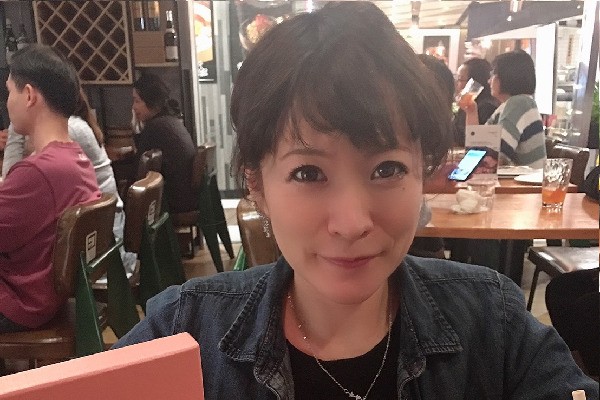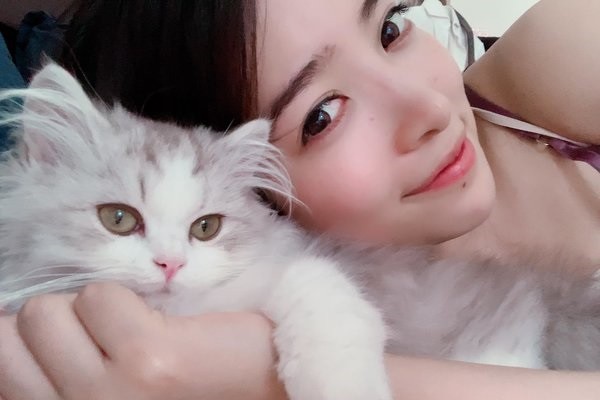Japanese Learning in Hong Kong TST
Native Japanese Tutor TAEKO

Native Japanese Teacher TAEKO
Native Language Japanese
Language Ability Japanese, Advanced in Mandarin, Communicate in Cantonese and English
Born TOKYO – Japan
Teaching Area Tsuen Wan, Mong Kok, Central, Wanchai, Causeway Bay, Yau Ma Tei, Hung Hom, TST etc
Teaching Japanese Japanese, Mandarin, English
Japanese Courses Provided by TAEKO
Hong Kong Native Japanese Tutor TST
Hi, everyone! I’m Taeko. I was born and raised in Tokyo, I’ve been living in Hong Kong since 2012. My hobby is reading, singing, watching comedy shows and to go to cat cafe
I speak Mandarin fluently. When I was an university student in Japan, I joined an one year exchange student program in Beijing University. After I graduated from university, I worked at Japanese company in China and Hong Kong for 13 years as Customer Service, Sales and Secretary. So I can teach you both business Japanese and manner as well. I will find the best way to improve your Japanese skills that would be useful for travelling, understanding Japanese culture, JLPT, job etc…
Learn from mistakes and practice make perfect! Let’s start together and have fun on studying Japanese!
皆さん初めまして。Taekoと申します。東京出身で、香港在住は8年になりました。元々漢字が好きだった私は高校時代に初めて中国に行き、日本とは違う価値観や活気に驚かされ、そこから中国語圏(大陸、香港、台湾)の文化に興味を持つようになりました。日本の大学では経営学部でしたが、中国での交換留学生活を経験し、現地の学生と言語を学び合ったのは良い思い出です。
大学卒業後は上海、杭州、香港の日本企業にて(CS、秘書、セールス)13年勤めましたので、敬語の使い分けやビジネス文章もレクチャーできます。香港では、日本語とマンダリン(一部広東語)で授業を行っています。授業中に学んだ単語や文法を、できるだけ多く使って会話し、沢山の量を一気に詰め込むのではなく、生徒さんが安心しながら内容をしっかり理解して頂けるように進めていきたいと思います。(但し、JLPTを目指す方には量も重視します) 日本には四季があり、毎月のように伝統的なイベントがあります。また、47ある都道府県での「食文化や人々の性格の傾向性」も地域ごとに異なる事をご存知でしたか?そのような日本文化等も肌で感じられるようにお話します。一緒に楽しく学んで参りましょう!
Why you become a Japanese teacher in Hong Kong?
There are lots of Japanese foods, Japan Anime, Japan Games selling in Hong Kong, I think this is the biggest reason Japanese influence on Hong Kong culture. Before I came to Hong Kong, I did not know it. Many Hong Kong people love to learn Japanese, making friends with Japanese, traveling to Japan, I wish I could help more Hong Kong people to learn to speak Japanese, then I became a Japanese teacher. I also hope Hong Kong students could share more Hong Kong cultural with Japanese people when they travel to Japan or work in Japan.
香港には日本の食品や物、アニメやゲームなどがあふれていて、多くの香港人の皆さんが日本文化に親しみをもってくれています。これは香港に来るまであまり知りませんでした。
香港人の皆さんに日本語を学んでいただき、日本人の友人を作ったり、旅行や様々な文化を楽しみ、日本を更に深く知ってほしいと思い、日本語教師を始めました。
そして、日本へ旅行やお仕事などで滞在する時には、香港で勉強した日本語で、日本人にも香港の魅力をたっぷり教えていただきたいです。
What difficulties do you think learning Japanese for Hong Kong students? And how will you help the students to learn Japanese?
I think the most difficult part for learning Japanese is Particle (助詞) and Keigo (敬語). Native Japanese speak Japanese without any thinking, we sometimes omit Particle which is OK, but some Particles if we omit the sentences will not make sense.
Especially for Keigo, even for native Japanese Keigo usages are difficult, the words in a polite way is quite difficult.
For teaching Particles, I usually explain to the students first, then make the sentences with the students, I will repeat the same particles several times and help the students to get used to it.
For teaching Keigo, I will teach the students in roleplays, changing different roles and practice the oral speaking with the students.
やはり助詞や敬語の使い分けは難しいのではないでしょうか。日本人は助詞を感覚的、無意識に使い分けていて、
会話の時は省略しても良い助詞もあれば、省略すると文としての意味が通じなくなる助詞もあります。
特に敬語は、日本人でも使いこなすのが難しいです。謙譲語や尊敬語があり、更に複数の言い回しが
存在するからです。
助詞は、基本の仕組みを説明後、例文を一緒に作ったり、会話で何度も同じ助詞を使って慣れていくように進めます。
敬語は、複数の状況を想定して一緒に文章を作ったり、劇のように動作を含めて練習するなど工夫をしながら進めます。
Japanese Teaching Approach
My Japanese lesson I will first teach Japanese vocabularies and grammar, and then follow the Japanese textbook.
For those who are interested in Japan travel conversations or learning Japanese for interests, I will find several topics the students are interested, and find some related learning materials in my lesson.
I will use picture cards and watch animation in my lesson, I will listen to the students’ leaning requirements and needs to learn Japanese.
文法や単語を基礎から順にしっかり学びたい方には、教科書に沿って授業を進めます。
旅行会話や趣味での日本語を知りたい方には、毎回いくつかのテーマを決め、適切な教材をこちらで準備し、授業を進めます。
絵カードを使用したり、動画を見ることもありますが、できる限り生徒さんのご希望に沿う形で授業を進めて参ります。
Ask TAEKO Teacher Japanese Learning Questions
TAEKO先生へ「失礼します」と「失礼しました」と「失礼いたしました」の違いについて教えていただけないでしょうか?
TAEKO先生’s Answer:
「失礼します」は、相手の管理する部屋に入る時や、軽く謝る時、人に何か尋ねたり頼んだりする時、また人と別れる時などに使います。
「失礼しました」は、「失礼します」の過去形ですが、相手の管理する部屋を出る時や、自分が既にした行為について軽くお詫びする時に使われることが多いです。
「失礼いたしました」は、「失礼しました」の謙譲表現です。より丁寧さの度合いが高まります。
上記の3つは普段よく使う表現ですが、自分のミス等で相手にしっかりと謝罪したい場面では、これらの表現よりも、「申し訳ございません」、更に深刻度が高い場合、「心よりお詫び申し上げます」などを使ったほうが、より相手に気持ちが伝わります。
TAEKO先生へ「でも」と「けど」と「ところが」と「しかし」の違いについて教えていただけないでしょうか?
TAEKO先生’s Answer:
これらはどれも逆説の表現、つまり反対や対比の関係を表した接続詞です。
「ところが」は後に続く内容が意外・予想外である度合いが高く、それ以外は一般的な逆説です。
「しかし」は説明文や論文等、書面の硬い表現で使われることが多く、「けど」「でも」は口語的で、弁解や言い訳のようなニュアンスもあるので、ビジネス等ではふさわしくない表現です。
詳細の意味は以下ご参照ください。
「でも」
前で述べたある内容に対して、「その内容から予想できない内容」「望まない内容」を述べる場合に使われます。
例:買い物に出かけました。でも、財布を忘れました。
「けど」
「けれども」の砕けた言い方です。
ある事柄に関して、ふつう「そうである」「そうなる」とは思えない事柄を述べる場合に使われます。
例:雨が降ったけど、運動会が開催された。
「ところが」
前の内容に対し、予想される内容と反対の事実を意外な驚きの気持を持って述べる場合に使われます。
例:テスト前日に沢山勉強した。ところが、勉強した内容が全く出題されなかった。
「しかし」
今まで述べてきた事柄を受けて、それと相反することを述べる場合に使われます。
例:こんな厳しいことは言いたくない。しかし、君のために言わなくてはならない。
TAEKO先生へ 「また」と「またね」の違いについて説明してくれませんか?
TAEKO先生’s Answer:
※「また」には副詞、接続詞、接頭語といった様々な使い方や意味がありますが、ここでは別れ際の場面に使う言葉として解説します。
「また」は、別れ際「それでは、また」と言う時に使われます。「それでは、また」の後に、「(今度)お会いしましょう」「(今度)ご一緒しましょう」という言葉が省略されています。「さようなら」とほぼ同じ使い方です。
「またね」は、「それでは、また」を使う相手よりも親しい間柄の友人(敬語を使用する必要のない相手)に対して使います。「バイバイ」とほぼ同じ使い方です。
Ask TAEKO Teacher Japanese Culture Questions
Unique Japanese Culture in Japan
There are some little shops, a vending machine, as it has got a place to put coins set aside, you may see many these shops and machines in the rural areas in Japan.
Umbrella stand in front of a convenience store… A rainy day, customers can put an umbrella in this simple umbrella stand without a key while shopping.
Sleeping on the train or on the roadside… Some people are tired or drunk and they sleep like they were at home.
Students who are not accompanied by the adults attend the school from their homes to the school on their own when they are at the first grade in the Elementary school in Japan. At some schools, elder students become leaders and arrange the students to attend school from the meeting place.
These all happened in Japan which means Japan is safe, but we also can say there is no sense of crisis. However I hope these happened in Japan will not disappear (^^;)
日本特有の習慣について紹介します。
無人販売…野菜等が、道端の無人店舗に並べられ、お金を入れる箱が置いてあります。「お客が正しい金額の現金をその箱に入れるしその箱は盗まれない」と信じて成り立っている商売で、田舎に多いです。
コンビニ前の傘立て…雨の日に設置され、お客は買い物中、この鍵もついていない簡単な傘立てに傘を入れておきます。
電車内や道端での爆睡…疲れたり酔っぱらっていたりで、家にいる時のように寝ている人がいます。
大人が付き添わない小学生の登下校…1年生から1人で家から学校まで登下校します。高学年がリーダーとなり集合場所から集団で登校する学校もあります。
これらの習慣は治安がいいとも言えますが、危機感がないとも言えます。個人的には消えてほしくない習慣です(^^;)
The other private Japanese teacher you may feel interested









Stay in Touch
RSS
Facebook
Twitter
Google +1